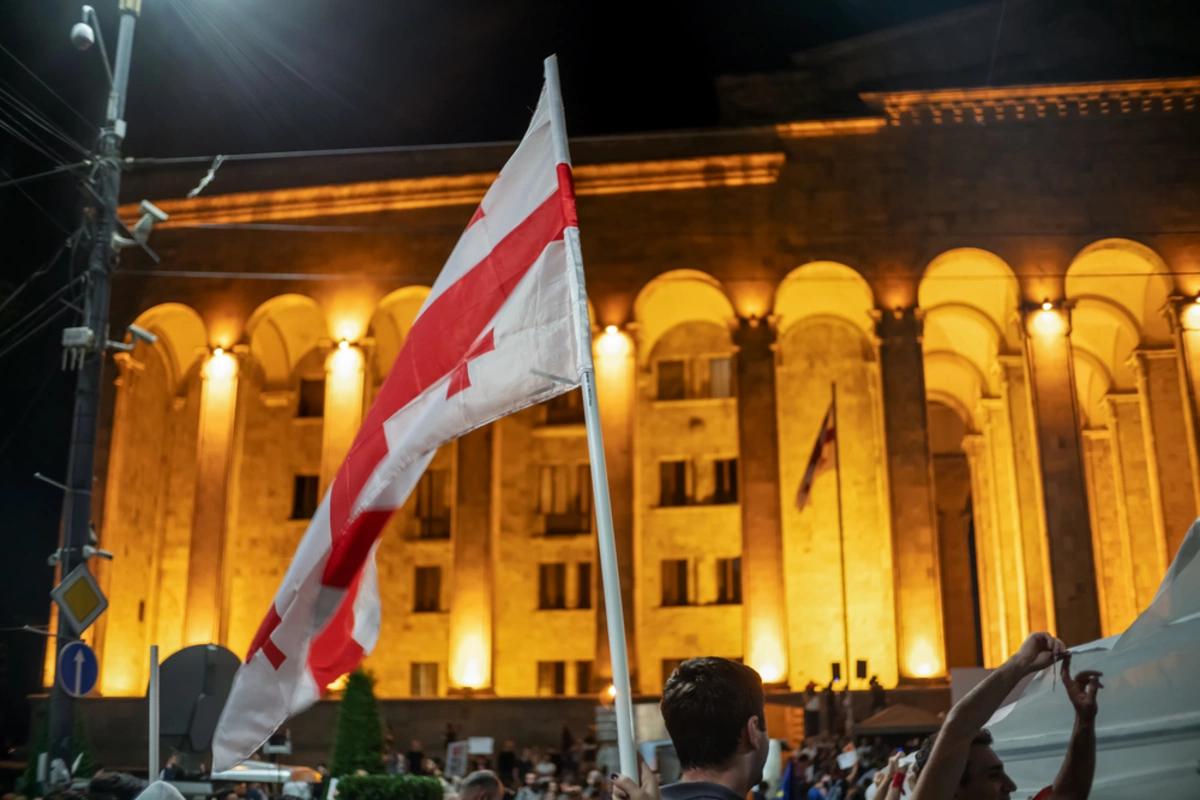
On 17 April, the draft bill on foreign agents passed the first hearing in Georgia’s parliament despite opposition and mass protests—but what will happen next?
Image: ERIK Miheyeu/Shutterstock
On 17 April, heated debates were held in the Parliament of Georgia regarding the draft bill on Foreign Agents. Afterward, Georgian Dream passed the law with the first hearing, with 83 in support and 0 against. The opposition did not attend the voting. Despite the ruling party's attempts to change society’s perception regarding the re-initiated law, claiming it only ensures transparency, the opposition and society continue to call it ‘the Russian law.’ It's worth mentioning that the ruling party passed another law with two hearings regarding the transfer of capital from offshore accounts, aiming for increased transparency. Opposition MP Roman Gotsiridze believes that the initiative is to protect Ivanishvili in case of sanctions from the West.
For three days, tens of thousands have flooded the streets of Tbilisi to protest. The most frequently used phrase was "No to Russian Law." Notably, the campaign against the law was joined by the National Football Team and the first Georgian UFC Champion, Ilia Topuria, along with other sports figures. Georgian Dream attempted 'sportswashing' with the message that their declared position is to join the European Union, but with dignity and full sovereignty.
The parliamentary hearings were held in parallel with the protests at the back entrance of the legislative body, which moved to Rustaveli Avenue after seven pm, gathering tens of thousands to protest. However, even more people joined the protest after the law passed the first hearing at the plenary session. It's worth mentioning that the government avoided mobilizing the protest, and the myth that the protesters were violent was debunked—compared to the previous day when a huge number of police were mobilized, and they used brutal force against the demonstrators.
President Zourabichvili expressed her disdain for the bill and was interviewed by major international media outlets such as CNNand France 24. She stated that Georgian Dream openly changed the foreign vector in favour of Russia by introducing this bill. However, she called on the demonstrators to maintain peace and use legitimate means, such as elections (which will be held on 26 October), to replace the ruling party with a coalition government. Despite Georgian Dreams's claims that the law aims to increase the transparency of CSOs and media, PM Kobakhidze has already used the term 'agent' against several NGOs and the President in his two-hour press conference, raising a reasonable doubt that the real purpose is to damage the reputation of independent organizations and persons associated with them.
Prior to these statements, there had been many calls from the United States, NATO, and the European Union to avoid adopting the draft bill as it was considered an obstacle to Georgia’s EU integration. But, Speaker of the Parliament Papuashvili, Leader of the Parliamentary Majority Mdinaradze, and Prime Minister Kobakhidze argued that the calls from the Western allies lacked argumentation as the law was about transparency and is a European value. The PM challenged the ambassadors of the United States and the European Union to engage in a public discussion over this law, which the diplomats obviously did not accept. Instead, they resorted to diplomatic démarche and discussed undisclosed issues with Kobakhidze behind closed doors.
Later, the President of the European Council, Charles Michel, directly addressed the ruling Georgian Dream to recall the law, stating it would not help Georgia’s EU integration; moreover, it would act as a trigger to distance Georgia from moving to the next phase. The same opinion was shared by the High Representative of the EU for Foreign Affairs and Security Policy/Vice-President of the European Commission, Josep Borrel, and representatives of the Department of State of the United States.
Next week in Parliament, committee sessions will be devoted to the draft bill on Foreign Agents, which will return to the Committee of Legal Issues for the second hearing. If it passes, two weeks later, Georgian Dream will register it on the agenda of the plenary session. The second plenary session means the law is almost adopted, as the third hearing is only a formality. It is supposed that the law will be finally adopted on 17 May—the International Day Against Homophobia, when Georgian far-right activists typically go out to protest so-called LGBTQI+ propaganda. As the opposers of the law are portrayed as propagandists of liberal values, this has the potential to cause clashes between the two social groups in the streets of Tbilisi.
Meanwhile, organizers of the protest rallies, mostly civil activists, are considering strategies to oppose the adoption of the draft bill. It is obvious that the protests will continue, as Georgians are concerned that with the ruling party’s decision, Russia’s influence will increase in the country. One option is to block major roads in Tbilisi and create discomfort—the activists are also considering idea of permanent tents.
Georgia stands at a critical juncture, wavering between its role as a beacon of democratic transition in the region and the ominous shift towards authoritarianism. Regrettably, the global democratic decline underscores the resilience of populist authoritarian regimes against protests. The unfolding events in Georgia serve as a litmus test, not just for its citizens but for other transitioning democracies worldwide. It's a pivotal moment for Georgian society to reaffirm the significance of their struggle.
Share on social media